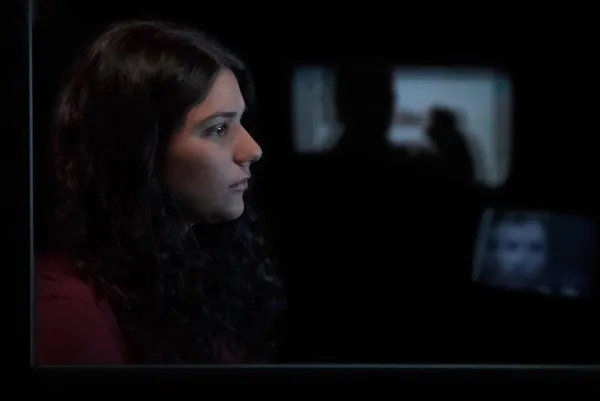Eye For Film >> Movies >> The Viewing Booth (2019) Film Review
The Viewing Booth
Reviewed by: Amber Wilkinson

"Confirmation bias" - the tendency for all of us to search for, recall or interpret things in a way that reinforces our own pre-existing beliefs - has had a lot of press lately and director Ra-anan Alexandrowicz examines the notion of it in 'real time'. The framing here is the complex setting of the Israeli occupation of the West Bank, but the debate that plays out before us could easily refer to any sort of situation where people have a tendency towards one side of an argument or another - from Brexit to conspiracy theories.
When Alexandrowicz asked a number of students with an interest in the Middle East to watch videos of Palestine/Israel encounters in the Occupied Territories, he told them it wasn't an experiment. That's true in that he wasn't, apparently, trying to test a specific hypothesis - although that is hard to know conclusively given that we see so little of the other potential subjects of the film - but the word experiment does apply in the wider sense of discovering something through observation.
The documentarian set up a viewing booth, equipped with 20 video clips shot by B'Tselem, The Israeli Information Center for Human Rights in the Occupied Territories, which describes itself as an "independent, non-partisan organisation" aiming to call out human rights violations, and 20 from what might be considered "more conservative" sources, including the Israel Defense Forces. "Try to verbalise what comes to mind," Alexandrowicz tells the participants. Maia Levy, a Jewish American with Israeli parents, who describes herself as coming from a pro-Israel perspective with regards to the Occupation, is very articulate, which is no doubt why she became the focus of the resulting documentary. She is open about her opinions and aware of her own preconceptions - which puts her head and shoulders above many who passively watch things they come across online.
Alexandrowicz's camera - and we - watch Levy as the various videos play, although the focus here is chiefly on those shot by B'Tselem. Maia says she's familiar with their output, noting that "they play with your head", an interesting observation that touches on the way that any of us can feel uncomfortable if we watch something that challenges our beliefs.
Watching a film of an IDF night raid on a family home, Levy, while expressing sadness for what she is seeing, also begins to critique what she's watching. Some of the oddities she spots - like a child seeming to forget his own name - are more empirical than others, such as the way she says of the mother, "I feel like she's lying," based on not much more than a sentence or two. In a later video, in which teenagers throw rocks, she initially assumes they're Palestinian kids and then, on discovering they're Israeli, it's interesting to see how she begins to look for other ways to rationalise what is happening.
It becomes apparent that Alexandrowicz finds himself and his own preconceptions challenged by some of what Levy says, especially as he is a documentarian who attempts to shift opinion with his work - particularly notable in his detailed scrutiny of justice in the Occupied Territories in The Law In These Parts.
It's also worth noting that in the first session, Levy is also critical, albeit to a lesser degree, of the police when she queries why they wake the family up in the night but barely search the home or questions whether a couple of young kids being offered cheese by soldiers was completely staged. That Alexandrowicz doesn't return to these clips when Levy comes back for a second viewing highlights the way in which choices documentarians make also influence the end result.
The documentary becomes increasingly thought provoking as the director increases his dialogue with Levy during her return to the booth and she, in turn, also has a dialogue with herself as she views footage of her own initial reactions to the videos. It is here that more general observations about the relationship between what is viewed and the viewer really come to the fore along with some troubling considerations of the way that fiction film and reality television may have an impact on the way people filter factual footage. The pair also discuss whether seeing videos that set out to undermine, in some way, firm beliefs, can actually end up reinforcing them, something that should give us all food for thought in what social media suggests is an increasingly divided world.
The dialogue, however, also emphasises the somewhat narrow scope of what is happening here. You begin to yearn for a second viewer - other than the documentarian with skin in the game - to come with a different set of preconceptions. You also might wonder what an older viewer, who has not grown up with constant video content - and who might, therefore, be less sceptical regarding it - would say about the clips. There's plenty that's provocative here, certainly - and you can feel the depth of Alexandrowicz's emotional reaction to what he is seeing - but it remains a single snapshot, albeit one that encourages us all to check our biases and privilege when we watch factual films.
Reviewed on: 28 Jun 2020

















